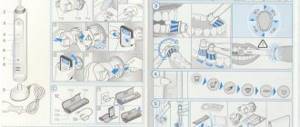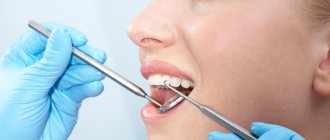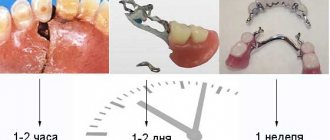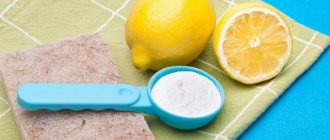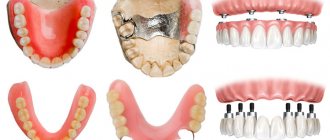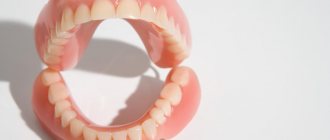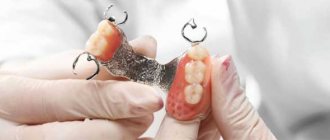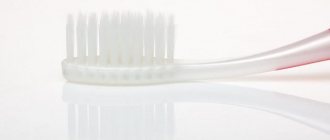Why is it necessary to clean dentures?
Dentures come in different types (the material and type may differ), but they have one thing in common - any artificial structure in the mouth is a source of microbial development. This is due to the fact that particles of food and water get into the space between the gum and the denture. Therefore, it is extremely important to take care of such teeth. What are the consequences of incorrect or untimely cleaning of the prosthesis?
- The color of the denture will change . Tobacco, drinking tea and coffee, and other natural dyes accumulate on the surface. This causes the color of the prosthesis to fade and lose its original shine.
- Unpleasant taste sensations will occur due to bacteria that affect the taste buds of the tongue .
- Small ulcers form on the mucous membrane . This occurs due to the constant load of the denture on the mucous membrane, but as soon as the adaptation process takes place (this takes 3-4 weeks), the discomfort disappears. To ensure that the inflammatory process (stomatitis) does not bother you, you must follow the rules of personal hygiene.
- Caries occurs. Its appearance can cause holes in the teeth. Therefore, to avoid plaque buildup on your dentures, it is important to clean your dentures properly.
- Gums become inflamed . This threatens with periodontitis if there is no proper treatment at the initial stage - with gingivitis.
- Bad breath occurs (its scientific name is halitosis). It appears due to toxins caused by bacterial activity.
In order to avoid the appearance of the above rather unpleasant symptoms, proper care of your dentures is necessary. Moreover, it does not matter how many teeth it protects. Standard brushing with a toothbrush and toothpaste will not be enough if you have a denture.
Recommended articles to read:
- Social services for older people
- Diseases of old age
- Valuable tips on how to choose a boarding house
Who should use a toothbrush with stiff bristles?
- Tendency to increased formation and mineralization of dental plaque.
- Crowded teeth and narrow interdental spaces.
- Having dentures or braces.
- Sensitive or damaged enamel.
- Periodontal inflammation and sensitive gums.
- The technique is not practiced in all clinics.
- Diabetes mellitus, poor blood clotting.
- Mobility of teeth.
- Wedge-shaped defect.
Attention!
The main danger of a toothbrush with hard bristles is damage to the enamel. This manifests itself in the form of reactions to cold and hot foods, as well as mechanical stress. Hard bristles can also be hard on your gums. On the other hand, the cleaning properties of a hard toothbrush are higher than those of soft analogues: if used correctly, it can effectively clean teeth from plaque.
Types of toothbrushes with stiff bristles
By purpose:
- classic toothbrushes for daily hygiene, which include hard brushes with the “hard” index, however, products marked “x-hard” or “extra hard” are not recommended for use every day;
- therapeutic and prophylactic - designed to affect certain areas of the oral cavity, in particular, this includes brushes with combined bristles. Depending on the tasks, the type of working surface of the head with different levels of beam position is selected;
- highly specialized - designed for the care of dentures and orthodontic structures; this category includes hard toothbrushes labeled extra hard, which allow you to effectively remove plaque and deposits.
By type of action:
- classic mechanical;
- electric with a movable head, which is driven by an electric motor; you should use hard brush heads with extreme caution, as they can damage the enamel and gums more than classic brushes;
- sonic and ultrasonic, the bristles of which make oscillatory movements thanks to the built-in generator.
Cleaning dentures: rules for daily and periodic care
Cleaning methods:
- mechanical;
- chemical;
To mechanically clean a denture you will need: a brush, toothpaste, water pressure, an irrigator and ultrasound.
To chemically clean the prosthesis, you can use effervescent tablets or disinfection solutions. First of all, for this you need:
- soft toothbrush;
- special double-sided brush;
- disinfection tablets;
- soft toothpaste;
- ultrasonic bath.
Below are the rules for caring for removable dentures made of plastic, nylon and other materials:
- After breakfast, the dentures are removed and cleaned in the hand or mouth with a soft brush and paste; it is also useful to use rinses.
- Every time after eating, the denture should be rinsed under running water.
- Before going to bed, clean the denture in your hand with a double-sided brush and toothpaste.
- During sleep or for 15-20 minutes, the prosthesis should be placed in a disinfectant liquid.
- In order to put on the denture after disinfecting liquid, it must be rinsed with running water and wiped dry.
- It is important to have your dentures professionally cleaned at least once a year. This can be done at a dental clinic.
A denture is a fairly fragile structure, so it is important to handle it with care. For example, when cleaning a denture with tap water, you should hold it firmly and do it over a sink, not over a bathtub, to avoid falling and breaking.
To keep your teeth healthy and looking nice, brush them with a soft toothbrush and toothpaste after every meal, not forgetting the palate and tongue. If you no longer have any teeth left, instead of using a toothbrush, soak a gauze pad in mouthwash and wipe your mouth with it. Thorough cleaning of the dentures is carried out once or twice a day. This happens with the help of a soft toothbrush and low-abrasive toothpaste. Please note: regular toothpastes are not suitable. When choosing, look at the abrasiveness factor (RDA), it should be from 0 to 25 (regular toothpaste has an RDA of about 60). You can use liquid soap or dishwashing detergent. Caring for your dentures is not enough with just cleaning; it is necessary to carry out complete disinfection (you will learn about this later).
Important: pay attention to the bristles of the brush used to clean the prosthesis - it should be soft (marked “soft”), hard bristles are not suitable. When cleaning, you do not need to make any special efforts so as not to bend the plastic or metal clasps of the prosthesis (hooks).
Do not choose bleaching pastes - they contain large abrasives, so their use can scratch the plastic and lead to the formation of microtraumas.
The slightest damage can contribute to the formation of plaque, tartar and deformation. The oral cavity also needs care, regardless of whether there are teeth there or not. What not to do:
- Place the prosthesis for storage in hot water.
- Rub too hard, press on the plastic and clasps.
- Remove the structure from your mouth at night for the first two weeks after production.
- Use rough cleaning methods, including untested folk methods (using vinegar, soda).
Periodic complete disinfection of the prosthesis
Due to some application features, the rules for caring for dentures may change. For example, due to the use of fixing cream for removable dentures. Its benefits are significant - it reduces the likelihood of food particles getting under the structure, since the denture lies tightly on the gum. Cleaning dentures can be done in different ways. With the help of pharmaceutical preparations - the most used, since they combine various substances (detergents, chelates, carbonates and oxidizing agents). By regularly using such preparations, you will eliminate accumulated plaque on the surface of your teeth in the shortest possible period of time. The most common tablets for dentures:
- Polident. Able to clean dentures from traces of coffee and tea. Permanent use is possible, since it does not contain abrasive particles. By regularly using this product, you will not compromise the integrity of the top layer of your prosthesis.
- Protefix. The advantages of this drug: it contains active oxygen, which kills harmful bacteria in hard-to-reach areas, and it does not change the color of the structure itself.
- MyoClean. Benefits: Brushing your denture removes bacteria on the denture surface, so dark deposits and plaque are less likely to form. The drug has a refreshing effect, thereby actively combating unpleasant odors.
- Dentipur. A distinctive feature of this fairly popular drug is its effect directly on the plaque itself, but the integrity of the structure is not compromised when cleaning the denture. It contains sodium chloride and citric acid. They easily remove dark stains on teeth and also fight bad odor.
The benefit of tablets for cleaning dentures is not only that they dissolve pigment plaque and tartar on the surface of the denture, kill 99.9% of all bacteria, but also that they whiten the denture from pigment spots.
The price of a package (30 tablets) is from 200 to 250 rubles. Directions for use: Place the tablet along with the prosthesis in a glass of lukewarm water. Within three minutes, a reaction occurs, due to which the denture is disinfected and becomes more fresh in appearance. At the end of the procedure, for a more thorough cleaning, take out the denture and walk over it with an old toothbrush dipped in this solution. Then rinse the prosthesis and hands with running water. The advantages of using disinfectants in the form of tablets and solutions for cleaning dentures: without mechanical impact and very gently they remove plaque and microbes from the entire denture, whiten the structure and freshen breath, have no contraindications and are easy to use (it is recommended to leave the denture overnight in liquid, so putting the tablet in the same glass is easy).
Under no circumstances should disinfectant solutions be used to clean structures directly in the oral cavity. After using cleaning liquids, be sure to rinse the denture in clean water.
In addition to pills, there are also folk remedies.
- Using a microwave oven. This method is only suitable for those structures that do not have metal parts. To destroy bacteria, place the denture in a container with a cleaning agent and place it in the microwave for two to three minutes. Next, you will only need to clean the denture from food debris and plaque.
- Add a small amount of lemon juice or any mouthwash to the glass of water where the dentures are stored. Thus, plaque will not accumulate on the dentures, and the surface will remain clean for a long time.
/p>
Used
Using an ultrasonic bath
This is one of the most suitable and effective ways to clean dentures. Advantages: cleans the denture of tartar, removes pigment plaque, removes bad breath; kills 100% of bacteria; does not require the use of any additional chemicals. The cost of an ultrasonic bath for cleaning dentures is about 2800 rubles. The device is intended not only for dental structures, you may need it in everyday life for contactless cleaning and disinfection of objects for any other purpose (baby pacifiers and bottles, precious metals, etc.).
How to properly store dentures
It is important to store dentures correctly, otherwise they will become deformed.
According to the recommendation of dentists, at first (about two weeks) the prosthesis should be worn constantly, only occasionally removed as necessary. Then you need to remove the denture for at least 6 hours, this is due to the fact that the tissues of the denture bed need regular rest. The environment in which dentures must be placed must be moist to avoid deformation. To do this, when removing the denture at night, place it in water or a special solution for soaking dentures (purchase at a pharmacy). If the water smells of chlorine, then dentures with metal elements should not be placed in it, as the metal parts of the structure may darken. Important: never forget that dentures become deformed for two reasons: due to drying out, and also because you put them in too hot water. The denture will no longer fit your gums, and you will feel pain and discomfort when wearing or eating.
How to whiten dentures
Dental structures darken due to plaque and tartar, so careful care of dentures is necessary.
In this case, they require bleaching. Whitening toothpastes, due to their high abrasiveness, can damage the denture, since its surface is less hard than tooth enamel and therefore more susceptible to abrasion and scratches. The best means for whitening dentures are effervescent tablets, for example, Corega or Lakalut Dent, or an ultrasonic bath. Read the material on the topic: Hearing aids for the elderly

